Blockchain technology, originally conceived as the backbone of cryptocurrencies like Bitcoin, has emerged as a transformative force across various sectors, including healthcare. At its core, blockchain is a decentralized digital ledger that records transactions across multiple computers in such a way that the registered transactions cannot be altered retroactively. This inherent characteristic of immutability, combined with transparency and security, positions blockchain as a promising solution for addressing some of the most pressing challenges in healthcare, particularly in the realm of data management and security.
As healthcare systems increasingly rely on digital records and interconnected devices, the need for robust mechanisms to protect sensitive patient information has never been more critical. The integration of blockchain technology into healthcare could revolutionize how patient data is stored, shared, and secured, ultimately leading to improved patient outcomes and enhanced trust in healthcare systems. The potential applications of blockchain in healthcare are vast and varied, ranging from secure patient data management to streamlining supply chain processes for pharmaceuticals.
By enabling a secure and transparent method for sharing information among stakeholders—such as patients, providers, insurers, and researchers—blockchain can facilitate better coordination of care and more informed decision-making. Moreover, the decentralized nature of blockchain means that patients could have greater control over their own health data, allowing them to grant or revoke access to their information as needed. This shift towards patient empowerment not only enhances privacy but also fosters a more collaborative approach to healthcare delivery.
As we delve deeper into the role of blockchain in securing patient data, it becomes evident that this technology holds the potential to reshape the landscape of healthcare data security fundamentally.
Key Takeaways
- Blockchain technology has the potential to revolutionize the healthcare industry by providing a secure and efficient way to store and share patient data.
- Blockchain can play a crucial role in securing patient data by providing a tamper-proof and transparent system for recording and sharing medical information.
- The advantages of using blockchain for data security in healthcare include improved data integrity, enhanced interoperability, and increased transparency.
- Case studies have shown successful implementation of blockchain in healthcare, such as using it for managing electronic health records and tracking pharmaceutical supply chains.
- Despite its potential, challenges and limitations of using blockchain in healthcare data security include regulatory hurdles, interoperability issues, and the need for widespread adoption and standardization.
The Role of Blockchain in Securing Patient Data
Enhanced Data Security through Blockchain Technology
The integration of blockchain technology in healthcare offers a significant advantage in securing patient data through encryption and decentralized storage. Unlike traditional healthcare systems that rely on centralized databases vulnerable to cyberattacks and unauthorized access, blockchain technology employs cryptographic techniques to ensure secure data storage across a network of computers. This makes it nearly impossible for malicious actors to alter or delete information without detection.
Improved Accountability and Traceability
Each transaction or update to the patient record is time-stamped and linked to previous entries, creating a chronological chain of events that enhances accountability and traceability. This level of security is particularly crucial in an era where data breaches are increasingly common and can have devastating consequences for both patients and healthcare organizations.
Streamlined Interoperability and Data Access
Blockchain’s decentralized architecture allows for greater interoperability among different healthcare systems. Patient data is often siloed within individual institutions, making it challenging for providers to access comprehensive medical histories when treating patients. By utilizing blockchain, healthcare organizations can create a unified platform where patient data is accessible yet secure. This not only streamlines the process of obtaining patient information but also reduces the likelihood of errors associated with incomplete or inaccurate records.
The use of blockchain technology in healthcare ultimately enables healthcare providers to make more informed decisions based on a holistic view of a patient’s medical history, leading to improved care quality and patient safety.
Advantages of Using Blockchain for Data Security in Healthcare

The advantages of employing blockchain technology for data security in healthcare extend beyond mere protection against breaches; they encompass enhanced efficiency, cost savings, and improved patient engagement. One of the most compelling benefits is the reduction in administrative burdens associated with managing patient records. Traditional methods often involve extensive paperwork and manual processes that can lead to delays and inefficiencies.
By automating these processes through smart contracts—self-executing contracts with the terms directly written into code—blockchain can streamline operations and reduce the time spent on administrative tasks. This efficiency not only frees up valuable resources but also allows healthcare professionals to focus more on patient care rather than paperwork. Moreover, the transparency inherent in blockchain technology fosters trust among stakeholders in the healthcare ecosystem.
Patients can have greater confidence that their data is being handled securely and ethically, while providers can trust that they are accessing accurate and up-to-date information. This transparency can also facilitate better collaboration among different entities within the healthcare system, such as hospitals, laboratories, and insurance companies. When all parties have access to a single source of truth regarding patient data, it minimizes discrepancies and enhances communication.
Ultimately, this collaborative environment can lead to more coordinated care efforts and improved health outcomes for patients.
Case Studies of Successful Implementation of Blockchain in Healthcare
Several pioneering organizations have begun to explore the practical applications of blockchain technology within the healthcare sector, yielding promising results that highlight its potential benefits. One notable example is the collaboration between IBM Watson Health and various healthcare institutions to develop a blockchain-based platform for sharing medical records securely. This initiative aims to create a decentralized network where patients can control their health data while allowing providers to access necessary information seamlessly.
Early results from pilot programs indicate that this approach not only enhances data security but also improves patient engagement by empowering individuals to manage their own health information actively. Another compelling case study involves the use of blockchain technology in tracking pharmaceutical supply chains. The MediLedger Project is an initiative designed to combat counterfeit drugs by providing a secure and transparent method for tracking medications from manufacturers to pharmacies.
By utilizing blockchain’s immutable ledger capabilities, stakeholders can verify the authenticity of drugs at every stage of the supply chain. This not only protects patients from potentially harmful counterfeit medications but also ensures compliance with regulatory requirements. The success of such initiatives demonstrates that blockchain can address critical issues within healthcare while simultaneously enhancing trust among stakeholders.
Challenges and Limitations of Using Blockchain for Data Security in Healthcare
Despite its numerous advantages, the implementation of blockchain technology in healthcare is not without challenges and limitations. One significant hurdle is the need for widespread standardization across various systems and platforms within the industry. Currently, many healthcare organizations operate on disparate systems that may not be compatible with blockchain solutions.
Achieving interoperability among these systems requires collaboration among stakeholders and may necessitate significant investment in infrastructure upgrades. Without a unified approach, the potential benefits of blockchain could be undermined by fragmented implementations that fail to communicate effectively with one another. Additionally, there are concerns regarding regulatory compliance and legal frameworks surrounding the use of blockchain in healthcare.
The Health Insurance Portability and Accountability Act (HIPAA) in the United States sets stringent guidelines for protecting patient privacy and data security. Integrating blockchain technology into existing frameworks may pose challenges in ensuring compliance with these regulations while still reaping the benefits of decentralization and transparency. Furthermore, issues related to data ownership and consent must be addressed; patients need clarity on how their data will be used and who has access to it within a blockchain system.
These complexities highlight the need for ongoing dialogue among policymakers, technologists, and healthcare providers to navigate the evolving landscape of blockchain in healthcare.
Future Implications of Blockchain Technology in Healthcare Data Security

Looking ahead, the implications of blockchain technology for healthcare data security are profound and far-reaching. As more organizations begin to adopt this innovative technology, we may witness a paradigm shift in how patient information is managed and shared across the industry. The potential for real-time access to secure patient records could lead to more timely interventions and personalized treatment plans tailored to individual needs.
Additionally, as patients gain greater control over their health data through blockchain solutions, we may see an increase in patient engagement and participation in their own care processes—a trend that could ultimately enhance health outcomes. Moreover, the integration of artificial intelligence (AI) with blockchain technology presents exciting possibilities for advancing healthcare data security further. AI algorithms could analyze vast amounts of data stored on blockchain networks to identify patterns and trends that inform clinical decision-making while maintaining strict privacy standards.
This synergy between AI and blockchain could lead to more efficient resource allocation within healthcare systems and improved predictive analytics capabilities. As we continue to explore these intersections between emerging technologies, it becomes clear that blockchain has the potential not only to enhance data security but also to drive innovation across the entire healthcare landscape.
The Potential Impact of Blockchain on the Future of Healthcare Data Security
In conclusion, blockchain technology represents a groundbreaking advancement in securing patient data within the healthcare sector. Its unique characteristics—decentralization, immutability, transparency—offer solutions to some of the most pressing challenges faced by traditional healthcare systems today. By enhancing data security while promoting interoperability among various stakeholders, blockchain has the potential to transform how patient information is managed and shared across the industry.
As demonstrated by successful case studies and ongoing pilot programs, organizations are beginning to realize the tangible benefits that this technology can bring. However, it is essential to acknowledge that challenges remain on the path toward widespread adoption of blockchain in healthcare. Issues related to standardization, regulatory compliance, and data ownership must be addressed collaboratively by all stakeholders involved.
Nevertheless, as we look toward the future, it is evident that blockchain technology holds immense promise for reshaping healthcare data security fundamentally. By empowering patients with greater control over their health information while fostering trust among providers and institutions, blockchain could pave the way for a more secure, efficient, and patient-centered healthcare system—one that ultimately leads to better health outcomes for all.
If you’re interested in how technology is revolutionizing various sectors, you might find it intriguing to explore how specific tools are tailored for professional needs, such as in graphic design. For instance, the article on the best laptops for graphic design in 2023 provides valuable insights into the top hardware choices that can support creative professionals in their work. This is particularly relevant as the demand for powerful, reliable technology parallels the need for advanced security measures in sectors like healthcare, where blockchain is significantly enhancing data security. Understanding the technological requirements and solutions in one field can provide a broader perspective on the importance of tailored tech solutions in others.
FAQs
What is blockchain technology?
Blockchain technology is a decentralized, distributed ledger system that records transactions across many computers in such a way that the registered transactions cannot be altered retroactively.
How is blockchain enhancing data security in healthcare?
Blockchain technology enhances data security in healthcare by providing a secure and tamper-proof way to store and share sensitive patient information. It ensures that data is encrypted, decentralized, and can only be accessed by authorized parties.
What are the benefits of using blockchain in healthcare data security?
Some benefits of using blockchain in healthcare data security include improved data integrity, enhanced privacy and security, reduced risk of data breaches, and increased trust among patients and healthcare providers.
How does blockchain ensure data integrity in healthcare?
Blockchain ensures data integrity in healthcare by creating a permanent and unchangeable record of transactions, making it nearly impossible for unauthorized parties to alter or manipulate the data.
What are some examples of blockchain applications in healthcare data security?
Some examples of blockchain applications in healthcare data security include secure patient data sharing, medical supply chain management, clinical trial data management, and identity verification for healthcare professionals.
Is blockchain technology widely adopted in the healthcare industry?
While the adoption of blockchain technology in the healthcare industry is still in its early stages, there is a growing interest and investment in its potential to enhance data security and improve overall healthcare operations.

